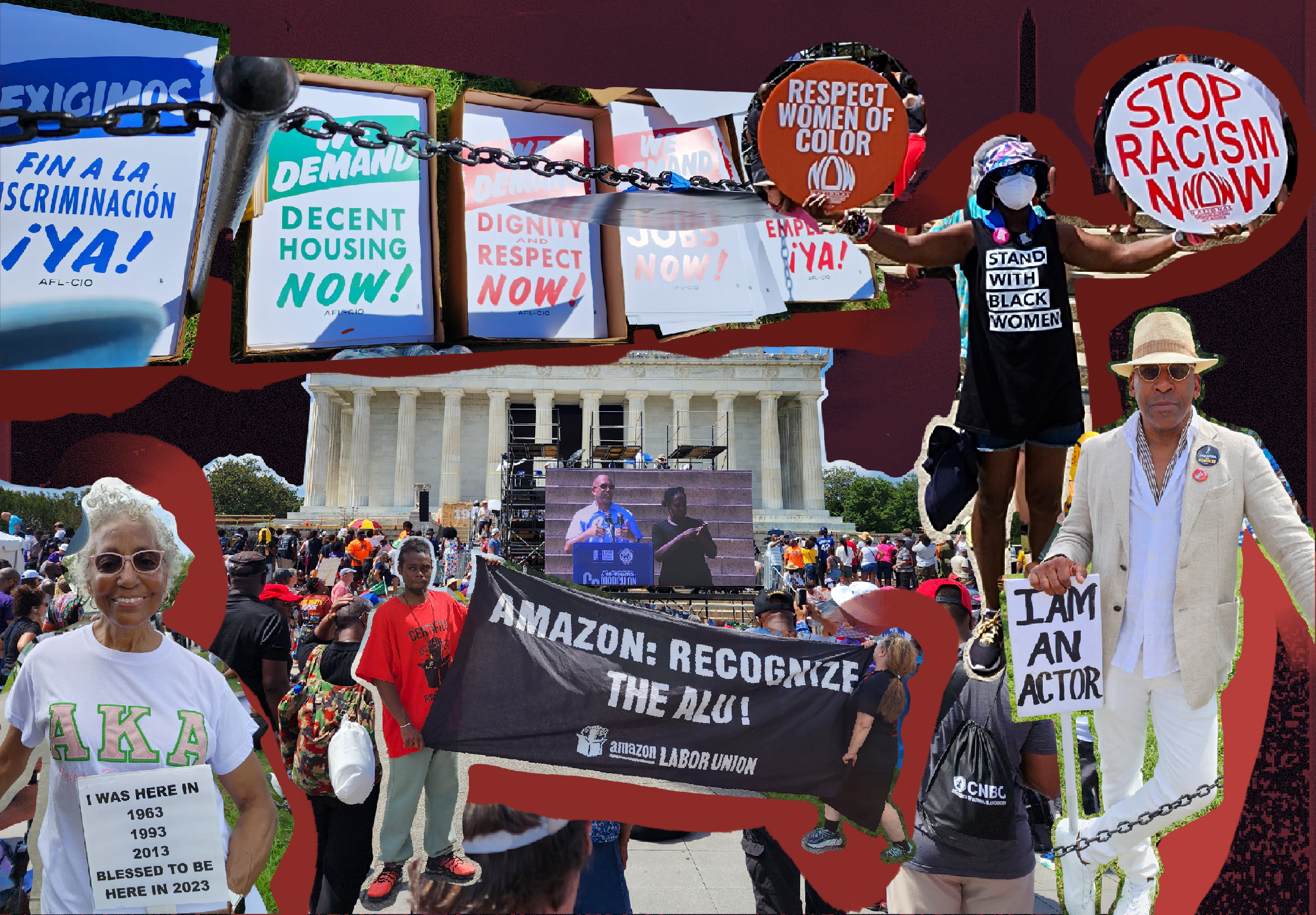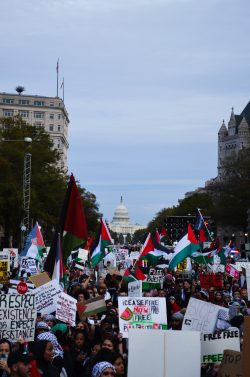Sixty years after Reverend Martin Luther King Jr. delivered his renowned “I Have a Dream” speech, almost 75,000 people gathered on the steps of the Lincoln Memorial to rally for equal rights on Saturday, Aug. 26.
Over 300 buses carried people from more than two dozen historically Black colleges and universities, as well as states including Georgia, Alabama, and New York. Amid the sweltering heat, activists gathered from a range of organizations, such as the National Association for the Advancement of Colored People, the American Federation of Labor and Congress of Industrial Organizations, the Human Rights Campaign, March for Our Lives, and Planned Parenthood to advocate for their respective progressive causes.
Representing the National Black Justice Coalition, Ollie Henry (CAS ’24) became the first ever nonbinary speaker at the March on Washington, alongside Hope Giselle, who became the first transgender speaker. Henry urged that more must be done to “push the boundaries of radical inclusivity” in these activist spaces.
In their speech, Henry compared the community to a garden where not all plants were equally tended to, in reference to queer people being denied access to basic resources like safe housing and affirmative healthcare.
Continuing the metaphor of a garden, Henry wore green pleated pants, lavender heels, and a white button-down with lavender flowers, lavender being a color long associated with queer empowerment. Due to wheelchair inaccessibility on the stage, they also used a lavender cane for mobility.
“My outfit alluded to the importance of lavender in calling out to other queer folks and I thought that was a beautiful way of calling in my community through time and space,” Henry said. “I find it important to pay attention to what I wore because it’s about embodying my praxis. Through and through, I’m here for Black queer liberation, and that flows through the words I speak to the clothes I wear to the ways I take up space to the ways I love.”
Henry’s call for equal rights for queer people aligned with the March on Washington’s historical focus on social justice and civil rights. This year’s organizers were Martin Luther King III—the eldest son of Martin Luther King Jr.—and other members of the King family, as well as civil rights activist Reverend Al Sharpton. They emphasized that the March on Washington was “not a commemoration, but a continuation.”
“We are here today to continue our march to a more perfect union; to fight racism, antisemitism, and hatred in any form; for voting rights, civil rights, working rights, LGBTQ+ rights, racial justice, social justice, economic justice, climate justice, free and fair elections, equal protection under the law; to make America the best version of herself,” House Democratic leader Hakeem Jeffries said from the podium.
The five-hour program featured high-profile speakers ranging from members of Congress and religious leaders to actors and nonprofit executives. Prominent civil rights activist Andrew Young was among the speakers. At 91, Young is one of the last surviving members of Martin Luther King Jr.’s inner circle and was one of the key organizers of the original 1963 March on Washington for Jobs and Freedom.
“I’m Andrew Young and I’ve been here before,” he said to rousing cheers and applause. “It’s been a long but wonderful struggle and I’m here to tell you that I don’t feel tired.”
Many speakers referenced the erasure of Black history, voter suppression, and the recent spate of conservative Supreme Court decisions—including the rollback of affirmative action in college admissions and the overturning of abortion rights—as threats to democracy.
Yolanda Renee King, Martin Luther King Jr.’s fifteen-year-old granddaughter, highlighted that her generation faced “the triple evils of poverty, bigotry, and violence,” as well as “global boiling.”
“We need to do more than end racism and poverty. We need to save our planet,” she said. “Cynicism is a luxury that my generation can’t afford. That’s why I believe my generation will be defined by action, not apathy.”
Attendees of the march spanned several generations, including college students, Black fraternities and sororities, Black churches, unions, and returning activists from 1963. While celebrating the progress of the civil rights movement, they echoed that these problems were not new.
“I was here in 1963, 1993, 2013, and I’m here today, at age 77,” Betty Waller Gray, an attendee who had traveled from Richmond, Virginia, told the Voice. “My mother was a civil rights activist, and she actually received an award from prison in 1948 for getting people registered to vote. At that time to register to vote was $1.50, which was a lot of money in 1948. She continued to be active in civil rights, and I took the torch and ran with it.”
Despite the supposed centrality of inclusivity and equitability to the March on Washington, several attendees noted flaws with the programming. Henry, for instance, commented on the atmosphere of apathy and even outright disdain towards queer people.
“We found ourselves sitting with how queer we really were in this space. We were acutely aware that we were outsiders, even though this was a movement by those dedicated to Black liberation,” they said to the Voice. “My partner and I were verbally harassed after my remarks. I’m extremely grateful to be the first nonbinary person to speak at the event, but in being the first, that doesn’t mean that the space was built for inclusivity, that there was scaffolding to make sure that we were supported at the table where a seat was pulled up for us.”
Criticism was also directed towards the Anti-Defamation League (ADL), which served as the event’s co-chair. Numerous organizations opposed to Israel’s oppression of Palestinians protested by flyering the steps of the Lincoln Memorial with infographics about the ADL’s defense of Zionism under the hashtag #DropTheADL. A day prior, the Palestinian Youth Movement also launched a teach-in about the ADL’s history of surveilling and repressing progressive movements.
The March on Washington, nevertheless, maintained a message of solidarity. Many speakers emphasized the beauty of community amid seemingly insurmountable challenges and expressed hope that, in Sharpton’s words, “the dreamers will win.”
Quoting his father, Martin Luther King III said, “How long till we get our freedom? Not long, because the arc of the universe is long but it bends towards justice. Let’s not give up, let’s not give in, let’s not give out.”





